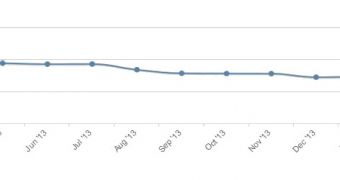Windows XP will be discontinued in approximately one month, but according to the latest set of statistics provided by market researcher Net Applications, users aren’t running away from it, but paradoxically more people are giving it a shot these days.
February 2014 market share figures reveal that Windows XP usage has increased on the desktop last month, which means that Microsoft has more or less failed in its mission to move users to a newer platform, be it Windows 7 or Windows 8.1.
Windows XP was installed on 29.53 percent of desktop computer worldwide last month, according to Net Applications, up from 29.30 percent in January 2014.
While it’s pretty clear that users aren’t yet ready to give up on Windows XP and switch to a newer version of the operating system, we’re also hearing that many are actually planning to wait until another build hits the shelves, especially amidst rumors that Microsoft has turned to a rapid release strategy that could bring new products to the market at a much faster pace.
As a result, many users are just waiting to see whether Windows 8.1 Update 1 or Windows 9 bring anything new to the market and only then decide if the Windows XP retirement makes sense, as it remains the only OS version that still runs flawlessly on old hardware and provides amazing reliability.
Windows XP was installed on approximately 39 percent of computers worldwide exactly one year ago, which means that Microsoft has only managed to upgrade 10 percent of the desktop PCs out there in 12 months, a figure that’s clearly below Redmond’s expectation.
Windows XP ended 2013 with a 28.98 percent market share, download from 38.31 percent in April 2013 and 33.66 percent in August. Microsoft was extremely optimistic last year and said that it hoped to cut down XP’s share to only 13 percent by April 2014.
This is clearly not going to happen and Microsoft needs to act very fast if it really wants to keep users on the safe side after Windows XP support comes to an end. Without security patches and updates, more and more users are very likely to become vulnerable and we all know that hackers won’t need too much time to develop exploits based on found flaws.
The good thing is that most security vendors out there have already announced that they want to continue offering support for Windows XP after April, so it should be really easy to find an anti-virus product that still works on this OS version.

 14 DAY TRIAL //
14 DAY TRIAL //